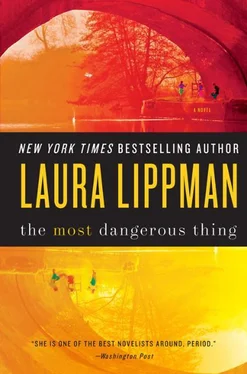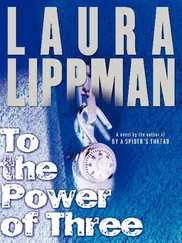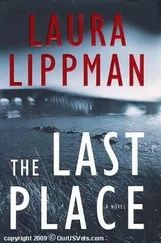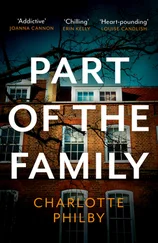“I just turned eleven,” Mickey said. “And he weighs, like, ninety pounds.”
“Try twenty,” put in Rick, the baby’s father, although this dark, good-looking man didn’t resemble his son, a white, doughy blob. Most babies were white doughy blobs, in Tally’s opinion. Why did people pretend to find them fascinating? Tally hadn’t even found her own children mesmerizing. She loved them, of course. But it had been hard, being a twenty-one-year-old girl with two children under the age of three. Hard and, well, boring.
“He’s adorable,” she said, flicking a finger under his chin. Chins. His mother shifted him on her hip. Rita was a pretty woman, despite being a little hard and faded. If Rick left her, she could still find another man. But after that? She wasn’t going to have much of a shelf life.
Tally automatically made this calculation upon meeting another attractive woman: How many more men were in her future? It was like assessing another person’s bank account. What are you worth? Do you have more than me or less than me? Most women had decidedly less. Rita was harder to judge. She was earthy, practically reeking of sex. Clem was a bigger prize than Rick, but Rick was a catch . He can probably fix things, Tally thought. He didn’t bother with this place because it was a rental. But if he owned his own home, everything would work, always. His dream house would function, no corners would be cut, no mistakes would be made.
“Would you like a beer?” Rick asked. She said she would. Gwen shot her a look. The look said many things. Such as: You never drink beer! If there’s no rush to get home, why are you here already? What are you doing? But Tally was just being polite.
Later, on the short trip home, Gwen said: “You acted sappy.”
“Sappy? What do you mean?”
“Weird. Drinking beer. Staying late, when you always say that good manners mean not hanging on and on.”
“I thought you wanted to spend more time with Mickey. She is your best friend.”
“Mickey said-” Gwen paused. “Mickey said you were flirting with her dad. She said women do that all the time, right in front of her mother.”
“I thought he was her stepdad and not even that, not really.”
“What do you mean?”
“They’re not married, right?”
Gwen’s face clouded with hard thought. Oh dear, what was so obvious to an adult could fly over a child’s head. Gwen honestly didn’t know that people could live together and have babies without being married. Tally remembered her playing Barbies with a friend back in the old neighborhood, Gwen informing the friend solemnly: “They can’t have babies if they’re not married. It’s a law.” Her daughter was naive in a way Tally had never been.
“I didn’t mean they’re not married, darling. Just that they didn’t have a big wedding. But that’s typical of second marriages. Forget I said anything.”
Talk about naive: children never forget what they are asked to forget. Within a week, Gwen had hurled this accusation at Mickey, after some silly argument, and Mickey reported the insult to her mother, who had, lord help them, driven to the Robisons’ house to confront Tally. Tally claimed a migraine and asked Clem to take charge of the mess, but he insisted that she at least be present while he defended her.
Rita was headed to work, her hair in a messy upsweep, sort of a deflated beehive. Her fury was so palpable that one could almost imagine real bees buzzing furiously around her head.
“It was a misunderstanding,” Clem said. “Tally never meant to say anything to Gwen.”
“Misunderstanding? More like wishful thinking, if you ask me. I’m used to women throwing themselves at Rick. I’m not used to them using little girls to carry their ugly gossip. Maybe Mickey shouldn’t be coming over here, if you have problems with my lifestyle.”
“Mickey and Gwen love each other,” Clem said. “They shouldn’t be punished because an adult made a mistake.”
“What do you mean, love ? My girl’s not queer.”
“Not that kind of love.” Tally could tell that Clem was working hard to keep his emotions in check, that he was repulsed by Rita’s quickness in projecting romantic love on the friendship of two innocent little girls, and her knee-jerk disgust at homosexuality. Perhaps Clem suspected, even then, that Fee was gay. At any rate, he talked Rita down, apologizing for Tally’s misstatement. (Which it really was; she had done everything to mitigate her slip.) He charmed her. Clem could charm. He had charmed Tally into giving her life away.
Now, almost four years later, watching her slim-hipped daughter switch about the kitchen in a way that seems designed to make the pleats on her skirt swing just so, Tally wonders if Mickey had loved Gwen in that way, if Rita’s instincts had been better than theirs. It would explain so much-Mickey’s abrupt disappearance from Gwen’s life as she plunged into the world of boys, boys, boys, Gwen’s fierce determination never to speak of her. What had they done, up in those hills, all those afternoons? A few Sapphic kisses, perhaps some show-and-tell? Then the Halloran boys had become part of their dyad, and Gwen had switched her affections to Sean. That ended, too. Everything ends.
“How do you feel about being an aunt?” she asks Gwen, hopeful that she will turn the question back to Tally, show a smidgen of empathy for her mother, or at least acknowledge that Tally is human, that she did not come into existence solely to produce Gwen, feed her, and clothe her.
“We never see them,” Gwen says. “So it’s hard to see how it will change much of anything around here. Why is that? Why don’t they visit? Even when they were dating, he never came home.”
“Well, he lives so far away-”
Her daughter can call bullshit with a glance.
“It’s how things are, Gwen. Sons tend to be absorbed by their wives’ families.”
“They only got married three months ago.” Tally remembers it well. Outdoors, in the Boulder backyard of the in-laws, Miller’s studious little wife wearing a wreath of flowers in her hair, Gwen staring raptly at the young couple exchanging their vows. Too raptly, for Tally’s taste. Gwen was seeing only the dress, the crown of flowers, the attention riveted on the bride.
“You’ll see. Miller’s just doing what most boys do, disappearing into his wife’s family. But daughters are for life.”
“What about Fee?”
“She’s still in college. I don’t expect Fee to partner off for a long time. Miller’s the odd duck, marrying young, having a baby right away.” But Tally wonders if Gwen is challenging her to gossip about Fee, to include her in the confidential discussions she and Clem have had about their oldest daughter.
“Huh.”
“But when you marry-”
“I’m never going to marry.” The viciousness of Gwen’s tone almost literally knocks Tally off balance. This is sincere revulsion, not the cool mockery she has been practicing. Tally finds herself placing her right palm on the edge of the stainless steel sink, steadying herself. She hates this sink, cold and industrial. Sinks should be porcelain, like the one in her parents’ home. Her parents’ home, with its pantry and maid’s room off the kitchen, a life she wanted no part of. Why? Why had she traded it for something even lesser? What was she thinking?
Perhaps Gwen realizes she has crossed a line because she softens her tone slightly. “I mean, I’m not going to marry young, or at least not have children young, not until I’m at least thirty. I want to have a career first.”
Her attempt at tact is only more hurtful. Gwen’s words hang in the kitchen, an utterly polite fuck-you to her mother. Why not just say: Upon pain of death , I am not going to be you. Tally wouldn’t mind. Tally doesn’t want to be Tally most days.
Читать дальше
Конец ознакомительного отрывка
Купить книгу












